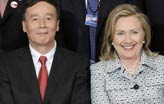From Overseas Press
4 US misperceptions about China's economy
Updated: 2011-05-16 17:03
(chinadaily.com.cn)
Many Americans don't seem to fully grasp the complexity of the Chinese economy and US-China economic ties, which generates tension between the two countries, according to Michael Schuman in an article on TIME magazine's website on May 12.
Schuman, a correspondent for TIME based in Hong Kong, says that the comments by Wang Qishan, China's vice-premier, that Americans have simple ideas about China makes him think about American attitudes toward the China-US economic relationship. He believes that there is a gap, a pretty big one in some cases, between what many Americans seem to believe about China and the reality of the country. He listed four common misperceptions.
First, China steals American factory jobs. According to Schuman, China can't be blamed for it. "The only crime committed by the Chinese people in this regard is that they are much poorer than Americans, and thus willing to work long hours in factories for a fraction of the wage demanded by workers in the US or other wealthy nations." And the shift of low-end manufacturing to emerging economies is part of a grand process of economic globalization in which production is becoming based where it is most cost-effective, says Schuman. "If this labor-intensive work didn't move to low-wage China, it would move to other low-wage countries (Indonesia, India, etc. etc.)."
Second, China's manipulation of its currency hurts the US economy. Many Americans believe that China's currency policy creates the country's giant trade surplus with America and thus hurts US industry and economic growth. However, a stronger yuan is no cure-all for the US trade deficit, says Schuman. According to the article, the yuan has appreciated by some 27% since 2005, but China's trade surplus (in goods) with the US has increased, from $202 billion in 2005 to $273 billion in 2010." The US overstates the importance of China's currency in the US-China economic relationship. Getting rid of the trade deficit with China demands reforms on both sides of the Pacific – to increase savings in the US and spending in China," says Schuman. A stronger yuan would contribute to that process, he notes, but "the economic relationship between the two nations is extremely complex and Americans can't blame the yuan as a primary source of its economic ills."
Third, China does capitalism better than America. But this is silly on many, many levels, says Schuman. First, it is almost impossible to compare the US and Chinese economies, since they are at such divergent levels of development. Second, the aspects of Chinese economic policy that are often praised in the US aren't capitalist at all. Third, China often displays the worst aspects of capitalism – labor abuses, environmental degradation, and quality and safety problems. Fourth, Chinese firms now lag far behind their American counterparts in innovation, management expertise and technology. "China grows more quickly, and perhaps the government can occasionally implement policy more smoothly, but to say that China is a 'better capitalist' is misguided."
Last, China will overtake the US as the world's No 1 economy. China will unlikely continue to grow 10% annually as China is dealing with a long list of problems of its own: persistent poverty, inflation, rising debt levels, income inequality, poor social services, bubble-quality property prices, poor technology and energy efficiency, excessive reliance on investment for growth, and so on, notes Schuman. Overcoming all of these hurdles won't be easy, and even if China does surpass the US in size, that doesn't mean America won't be a major force in the global economy as a primary source of innovation and new technologies, and key consumer market, says Schuman.
It is about time all the Americans get real about what is really going on in China, concludes Schuman. "The simplistic sloganeering that goes on the in US about China only intensifies those problems and makes them harder to resolve."
Specials

Comments on S&ED
The China-US Strategic and Economic Dialogue in Washington earlier this month achieved some remarkable results.

The song dynasty
There are MORE THAN 300 types of Chinese operas but two POPULAR varieties are major standouts

Sino-US Dialogue
China and the US hold the third round of the Strategic and Economic Dialogue from May 9-10 in Washington.